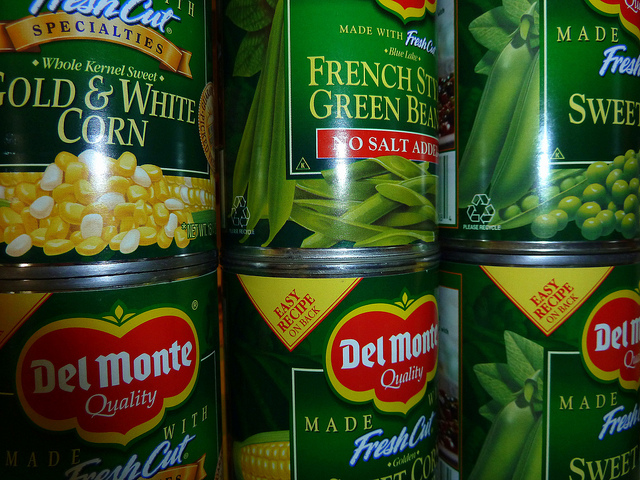健康與環境團體合作的調查報告發現,近200個品牌與通路販售的食品罐頭中,有67%驗出與乳癌、前列腺癌、不孕和與第二型糖尿病有關的賀爾蒙干擾素雙酚A。
拒用雙酚A承諾 多家企業破功
這份「消費者注意:食品罐頭塗料中的有毒雙酚A或更糟的添加物」(Buyer Beware: Toxic BPA & Regrettable Substitutes in the Linings of Canned Food)報告,首次列出這些化學物質並說明其安全性。數百份科學研究也顯示,不論濃度是以ppb或是ppt計,雙酚A都可能增加乳癌、前列腺癌、不孕、第二型糖尿病、肥胖、氣喘、注意力缺失症等行為改變有關。
部分企業曾承諾不再用雙酚A衍伸化學物質做罐頭塗料,但調查報告顯示這些食品公司並未實現諾言。
美國食品藥物管理局(FDA)稱目前的雙酚A含量對成人而言是安全的,但是FDA在2012年禁止銷售含有雙酚A的奶瓶和兒童用杯子。部分食品公司則用其他化學物質取代雙酚A。
番茄酸性與雙酚A作用 民團:少吃罐頭食品
雖然康寶(Campbell)公司表示正努力淘汰雙酚A,報告抽樣出的15個康寶食品罐頭樣本全都含有雙酚A環氧樹脂。康寶公司28日表示,將於2017年中前停用雙酚A罐頭塗料,改用丙烯酸或聚脂纖維塗料。
康寶總裁亞歷山大(Mark Alexander)表示,淘汰雙酚A的技術和財務挑戰甚鉅,康寶仍在努力中。尤其是含有番茄的罐頭,因為番茄的酸性會隨時間和部分罐頭塗料作用。
報告抽樣出14種美國台爾蒙食品(Del Monte)罐頭,71%(10種)含有雙酚A環氧樹脂;12種通用磨坊(General Mills)罐頭中,半數含有雙酚A,包括浦氏牌(Progresso)罐頭湯和綠巨人玉米罐頭。
艾咪廚房(Amy's Kitchen)、Annie's Homegrown、Hain Celestial Group和康尼格拉集團(ConAgra)則全數未檢出雙酚A,並公布其雙酚A替代品。最後,為確保食品和飲料的安全性,報告提供消費者幾點建議:
- 用玻璃、瓷器和不鏽鋼儲存食品和水。玻璃罐容易清洗,可重複用作食器、盛裝飲料、儲存、冷凍和加熱食品。
- 以微波爐加熱時用玻璃和瓷器盛裝食物。
- 儘量少吃罐頭食物,選擇新鮮或冷凍食物。
- 選用玻璃或其他安全容器裝的湯品或醬料。
- 不要使用罐頭。豆子浸泡到隔天就使用,或用壓力鍋烹調乾豆子,可在一小時內上桌。
A new report from six health and environmental groups finds 67 percent of nearly 200 food cans from dozens of brands and retailers tested positive for Bisphenol A, a hormone-disrupting chemical linked to increased risk of breast and prostate cancers, infertility and type-2 diabetes.
The report, “Buyer Beware: Toxic BPA & Regrettable Substitutes in the Linings of Canned Food,” was a collaborative effort by: the Breast Cancer Fund; Campaign for Healthier Solutions; Clean Production Action; Ecology Center; Environmental Defence (Canada); and Safer Chemicals, Healthy Families’ Mind the Store campaign.
Hundreds of scientific studies have linked low levels of BPA, measured in parts per billion and even parts per trillion, to an increased risk of breast and prostate cancer, infertility, type-2 diabetes, obesity, asthma, and behavioral changes including attention deficit disorder.
The U.S. Food and Drug Administration claims that BPA is safe for adults to consume at the current levels, but in 2012 the agency banned the sale of baby bottles and children’s cups containing BPA.
Some companies have made promises to discontinue lining their cans with BPA-based chemicals. But the “Buyer Beware” analysis shows that, across the board, canned food manufacturers large and small are not making good on these promises.
Some canned food companies are replacing BPA with other chemicals. For the first time, this report identifies the replacement materials in can linings, and documents their safety.
The study found 100 percent of Campbell’s cans tested (15 out of 15) contained BPA-based epoxy, even though the company claims to be making progress in its transition away from BPA.
On Monday, Campbell’s outlined the company’s plans to remove Bisphenol A from the linings of its cans by the middle of 2017 and transition to acrylic or polyester linings in all its soup cans.
Mark Alexander, president of President, Americas Simple Meals & Beverages, a Campbell’s company, said Monday that the technical and financial challenges have proven daunting and the company is still dealing with the “enormity of the task.”
A particular challenge is cans containing tomatoes, which are naturally acidic and can react with some linings over time, said Alexander.
The “Buyer Beware” study tested 14 cans of food from the Del Monte brand and found that 71 percent (10 out of 14) tested positive for BPA-based epoxy resins.
Of the 12 General Mills cans sampled for the study, half tested positive for BPA, including Progresso and Green Giant.
But not all the news is bad.
Amy’s Kitchen, Annie’s Homegrown (recently acquired by General Mills), Hain Celestial Group and ConAgra have fully transitioned away from the use of BPA and have disclosed their BPA alternatives. No BPA-based epoxy resins were detected in any of the cans tested from these brands.
Finally, to ensure food is safe to eat or drink, the “Buyer Beware” report recommends that consumers:
- Use glass, ceramic and stainless steel food storage containers and water bottles. Glass jars are easy to clean and can be reused for serving, drinking, storing, freezing and heating foods.
- Use glass and ceramic in the microwave.
- Avoid canned foods whenever possible, choosing fresh and frozen foods instead.
- Look for soups and sauces in glass or other safe packaging.
- Skip the can. Soak beans overnight and cook them the next day, or use a pressure cooker for dried beans, which will be recipe-ready in an hour.
※ 全文及圖片詳見:ENS









